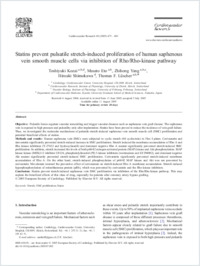Statins prevent pulsatile stretch-induced proliferation of human saphenous vein smooth muscle cells via inhibition of Rho/Rho-kinase pathway
- Kozai, Toshiyuki Cardiovascular Research, Institute of Physiology, University of Zürich, Switzerland - Department of Cardiovascular Medicine, Kyushu University Graduate School of Medical Sciences, Fukuoka, Japan
- Eto, Masato Cardiovascular Research, Institute of Physiology, University of Zürich, Switzerland
- Yang, Zhihong Cardiology, Cardiovascular Center, University Hospital, Zürich, Switzerland - Cardiovascular Research, Institute of Physiology, University of Zürich, Switzerland - Vascular Biology, Institute of Physiology, University of Fribourg, Switzerland
- Shimokawa, Hiroaki Department of Cardiovascular Medicine, Kyushu University Graduate School of Medical Sciences, Fukuoka, Japan
- Lüscher, Thomas F. Cardiology, Cardiovascular Center, University Hospital, Zürich, Switzerland - Cardiovascular Research, Institute of Physiology, University of Zürich, Switzerland
-
11.08.2005
Published in:
- Cardiovascular Research. - 2005, vol. 68, no. 3, p. 475-482
English
Objective:
Pulsatile forces regulate vascular remodeling and trigger vascular diseases such as saphenous vein graft disease. The saphenous vein is exposed to high pressure and pulsatility only after implantation. Statins have been proved to reduce the incidence of vein graft failure. Thus, we investigated the molecular mechanisms of pulsatile stretch-induced saphenous vein smooth muscle cell (SMC) proliferation and potential beneficial effects of statins.Methods and results:
Human saphenous vein SMCs were subjected to cyclic stretch (60 cycles/min) in Flex I plates. Cerivastatin and simvastatin significantly prevented stretch-induced increase in SMC proliferation. Stretch induced the membrane accumulation of Rho A and Rho kinase inhibitors (Y-27632 and hydroxyfasudil) and dominant negative Rho A mutant significantly prevented stretch-induced SMC proliferation. In addition, stretch increased the levels of both p44/42 mitogen-activated protein (MAP) kinase and Akt phosphorylation. MAP kinase kinase (MEK)1/2 inhibitor U0126, phosphatidylinositol (PI) 3-kinase inhibitors (wortmaninn and LY294002), and dominant negative Akt mutant significantly prevented stretch-induced SMC proliferation. Cerivastatin significantly prevented stretch-induced membrane accumulation of Rho A. On the other hand, stretch-induced phosphorylation of p44/42 MAP kinase and Akt was not prevented by cerivastatin. Mevalonate restored the preventive effect of cerivasatain on stretch-induced Rho A membrane accumulation. Stretch induced hyperphosphorylation of retinoblastoma protein (pRb), which was prevented by cerivastatin and the Rho kinase inhibitors.Conclusion :
Statins prevent stretch-induced saphenous vein SMC proliferation via inhibition of the Rho/Rho-kinase pathway. This may explain the beneficial effects of this class of drug, especially for patients after coronary artery bypass grafting.- Faculty
- Faculté des sciences et de médecine
- Department
- Département de Médecine
- Language
-
- English
- Classification
- Biological sciences
- License
-
License undefined
- Identifiers
-
- RERO DOC 5430
- DOI 10.1016/j.cardiores.2005.07.002
- Persistent URL
- https://folia.unifr.ch/unifr/documents/300066
Statistics
Document views: 194
File downloads:
- Document: 233
